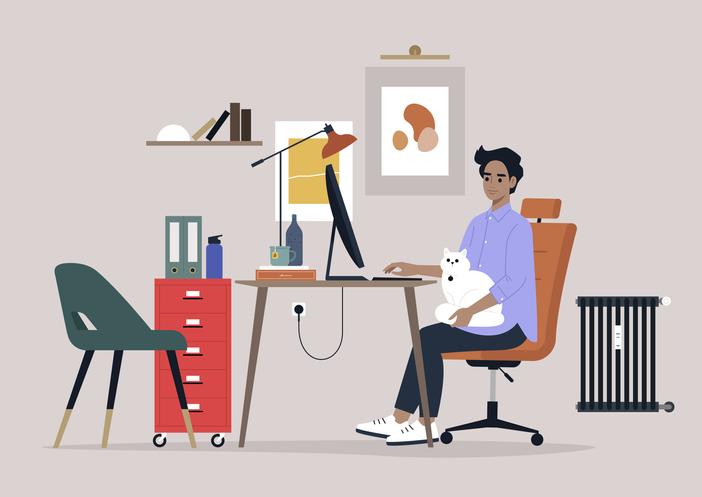
Five steps for creating the ideal home office
So, the picture is finally clearer. The decision to work from home has been made and your university, senior management and direct manager agree. But there is still a great deal of work to do if you are to create an optimum working environment in your own home. Here, I propose five areas and what to consider for each of them so that you are comfortable and productive, and experience positive well-being.
Workspace
- Think carefully and assign yourself a space where you feel good and are able to avoid distractions when you need to focus. Make sure there is good lighting, low noise levels and fresh air, as well as a stable desk, a good chair and decoration that inspires you without distracting you.
- Check air quality. In the case of air conditioning, you should check the filters and the maintenance of the equipment because cleanliness is very important for these machines.
- Where possible, try not to consume food in your workspace.
- If you can, personalise and improve your space. Change the colours and lighting according to your liking and even add some background music.
- Ensure you have all necessary items – headed paper, folders, documents and so on – from your university if needed.
- Depending on where you are located, to avoid distractions you might consider a security camera or other security measures to take care of your property and allow you to focus.
Technology
- If your university does not provide a computer, you will have to invest in one that meets the requirements of your daily tasks. Be sure to get a good voltage regulator with enough protection for variations and, if you can, a backup battery that will allow you to continue working.
- Check your internet plan and compare a few companies. This is not only a matter of price, but also of coverage and capacity, along with prompt response times in case of internet issues.
- Invest in good-quality headphones and a microphone. With today’s technology, this can drastically reduce background noise and allow others to hear you clearly. Again, your university might help with these costs.
- Make sure you have all the software and hardware you need, from the most up-to-date software licences to printers.
Self-regulation
- Establish schedules and routines. Give yourself time to walk around a bit and attend to other situations that might arise at home. Discipline and commitment with habits will help you to achieve better results and feel good. If you need to go out, try to leave everything in order to ensure a smooth return to work.
- Taking courses is a good habit to get into. Developing leadership, supervision and teamwork skills is never a bad option.
Socialisation
- Even though your house is your new office, it’s important to stay close to your co-workers and team leaders, so be sure to arrange virtual meetings or grab a coffee in person. If possible, it can be beneficial to assign a different and comfortable space for informal online catchups.
- Do not abuse other people’s time or try to get everyone to work at your pace. Work with empathy and collaboration to the fore, as you would if working in person.
- Be discreet with calls and conferences. Your neighbours do not need to know everything. Consider whether it will be necessary to acquire an additional phone line exclusively for work.
Mind and body
- Since you will be at home for most of your time, it’s doubly important to consider physical activity, stay hydrated and maintain a good diet.
- Give yourself a short break from time to time. It will allow you to focus better and get your creativity flowing.
- Similarly, do not sit all day. There are even adjustable desks that allow you to work standing up for periods of the day.
- Consider working in a temporary office or café from time to time. It’s always good to change scenery.
Our homes today are increasingly the places where we live, work and have fun. This makes it all the more crucial that we achieve a good balance for our mind, body and spirit by ensuring our home working environment is as conducive as possible to good physical and mental health.
Pablo A. Torres is a faculty professor at Tecnológico de Monterrey, Mexico.
If you found this interesting and want advice and insight from academics and university staff delivered direct to your inbox each week, sign up for the THE Campus newsletter.




